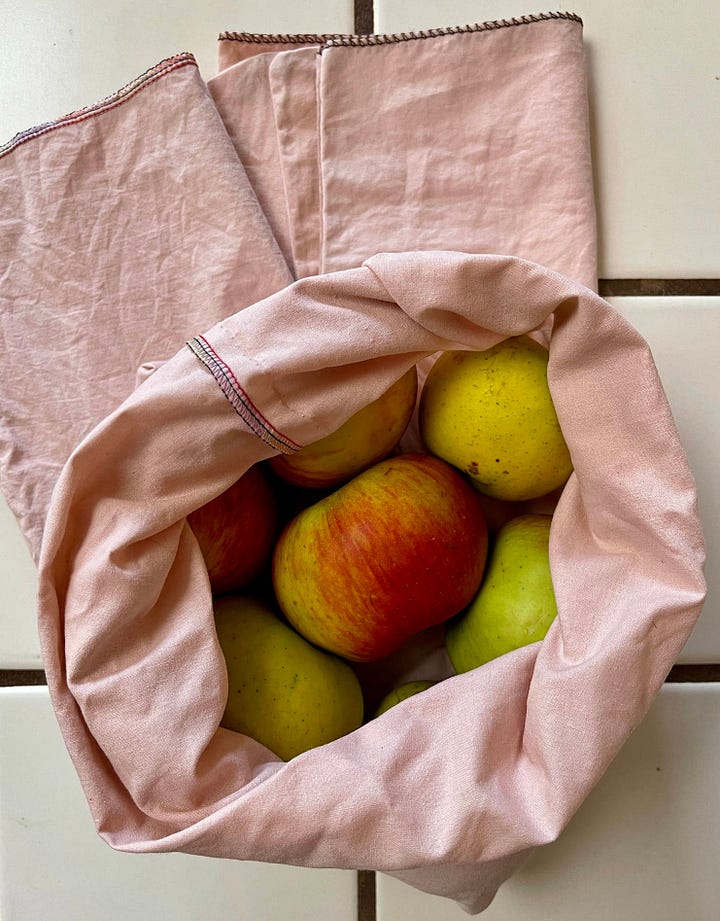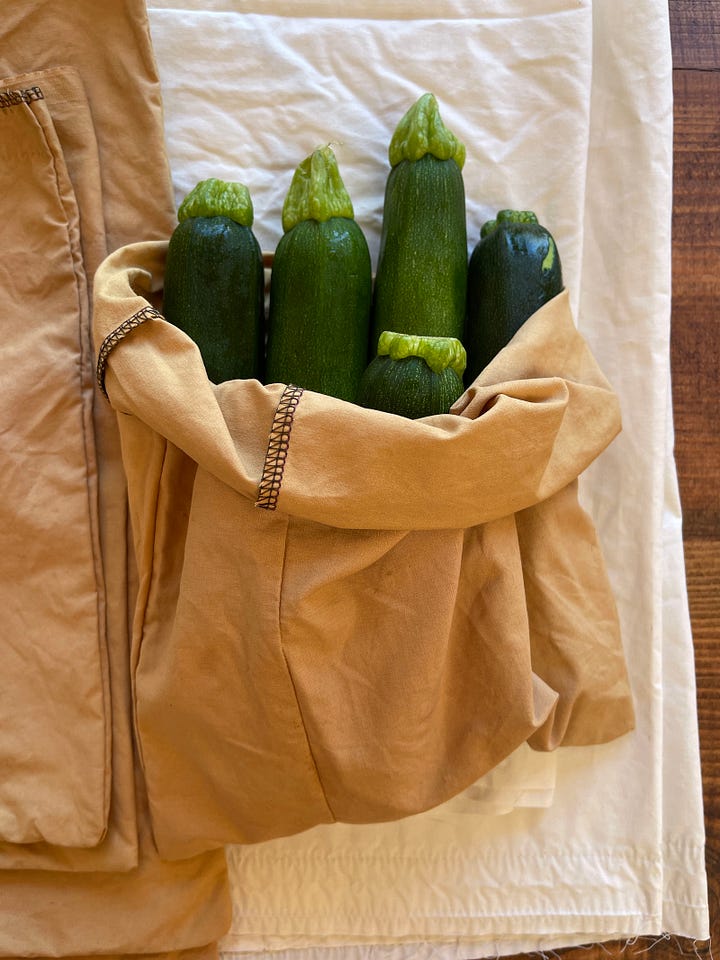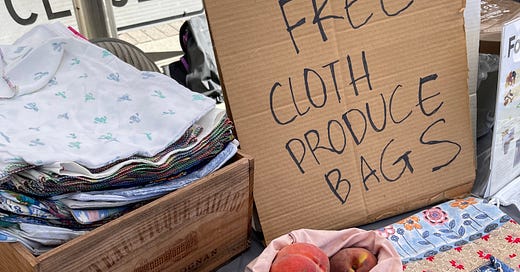Although Plastic Free July ends in less than a week, we can reduce plastic pollution year round. One of the easiest ways to do that is to fill reusable cloth produce bags with unpackaged fruit and vegetables at the grocery store or farmers’ market. (Eating more fresh fruit and vegetables also reduces plastic since produce has its own packaging, unlike highly processed food.) You can buy these bags online and in many shops or, if you possess rudimentary sewing skills, you can make them out of scrap fabric for free.
If you do make some, you may want to organize a sewing bee to sew more. I started hosting these in 2018 in my home. (We held one session at the library, using the bank of sewing machines available there.) We sew our produce bags out of donated, unwanted cloth that might otherwise end up in landfill and give the finished produce bags away at the farmers’ market. The bags not only provide shoppers with an alternative to single-use plastic, they also raise awareness about plastic pollution.
This past Saturday, we handed out another 267 bags, bringing our total to 3,694. (Thank you again to the city’s Environmental Services Department for allowing us to squat in your shady booth.) Used just once a week, these 3,694 bags can replace 192,088 plastic bags in a year (3,694 x 52). And we are just one small group!
Everyone benefits
I can’t explain exactly why these produce bags make shoppers so disproportionately happy. People do love free stuff. But I think it goes beyond that. Perhaps they believe we can’t do anything about plastic pollution or the climate crisis or, well, anything at all and seeing a group of ordinary people trying to make a small difference brings smiles to their faces.
The sewing bees certainly make the participants happy. Over humming sewing machines, we socialize, guzzle tea and devour fruit galettes my daughter MK or I bake. The phones (and bad news) stay out of sight (I do take some pictures…) and we benefit from the act of making, which can reduce anxiety (unlike passive consumption).
Not everyone who attends our sewing bees knows how to sew though (some have learned). That works out well because we also need people to iron and cut fabric and to inspect the finished bags.
Start a sewing bee in three steps
1. Find your people
You really need only one other person to form a group. If you belong to a church or teach at a school, you could launch this project there and likely find many willing participants. As people learn about the sewing bee, you’ll attract members. Every time we hand the bags out, someone asks to join our group.
2. Start making
Save time by cutting many bags out before your friends arrive.
Synthetic fabric sheds microplastics in the washing machine so ideally, choose natural fibers. This cotton thread comes on a cardboard spool (almost all other spools are plastic). It’s expensive but people regularly donate money to our group at the farmers’ market so we spend that on the expensive thread. (We also bought an additional used serger with donations!)
If you want to get fancy, you could dye white or beige fabric with avocado pits (for pink bags) or onion skins (for orangey-brown). I think I’ll try making tie-dye bags with these natural dyes.


3. Give the bags away
It’s your group. Distribute the bags however you like. Your first bags might go to members of your group or to friends and family who would use them. Once everyone is fully supplied with produce bags, put the remaining bags in your giveaway stash.
More ways to build community while reducing pollution
Sewing may not be your thing.
Community swap
Declutter, pick up something you could use and socialize—all for zero dollars. Do some pre-swap swapping wherever you organize the event (e.g., Google Docs, Evite, social media). Read more about organizing a swap here.
Litter pickup
Clean up a beach, park, or, sadly, literally anywhere on the planet. Go here to get started.
Zero-waste cooking club
You could plan to get together once a month or once every couple of months, or just occasionally. Everyone brings jars or other containers to take home a bunch of food to enjoy for the week.
Letter writing
Because politicians rarely hear from their constituents, when they do, they pay attention and they track the number of messages they receive on various topics. You could tell your representatives to take a strong stance on the Global Plastics Treaty or to end subsidies for the fossil fuel industry that heats up the planet with impunity, for example. Go here for more info.
Community garden
You’ll meet the nicest people at a community garden. And you might score some free plants and seeds! Community gardens can reduce some of the plastic you find at nurseries—the plant pots; bags of soil, mulch and fertilizer; many packaged seeds and bulbs. Find a community garden here (or add yours).






I’m not surprised your bags make people happy! Everyone loves an unexpected gift, not only that but a homemade one and one that helps the recipient follow through on their own aspirations to care more for the planet. I bet you made a few people’s day.
Thank you for this timely reminder that there are so many easy alternatives to single use. It’s easy to be overwhelmed by the bad news and forget that many of the solutions have been around for centuries or millennia.